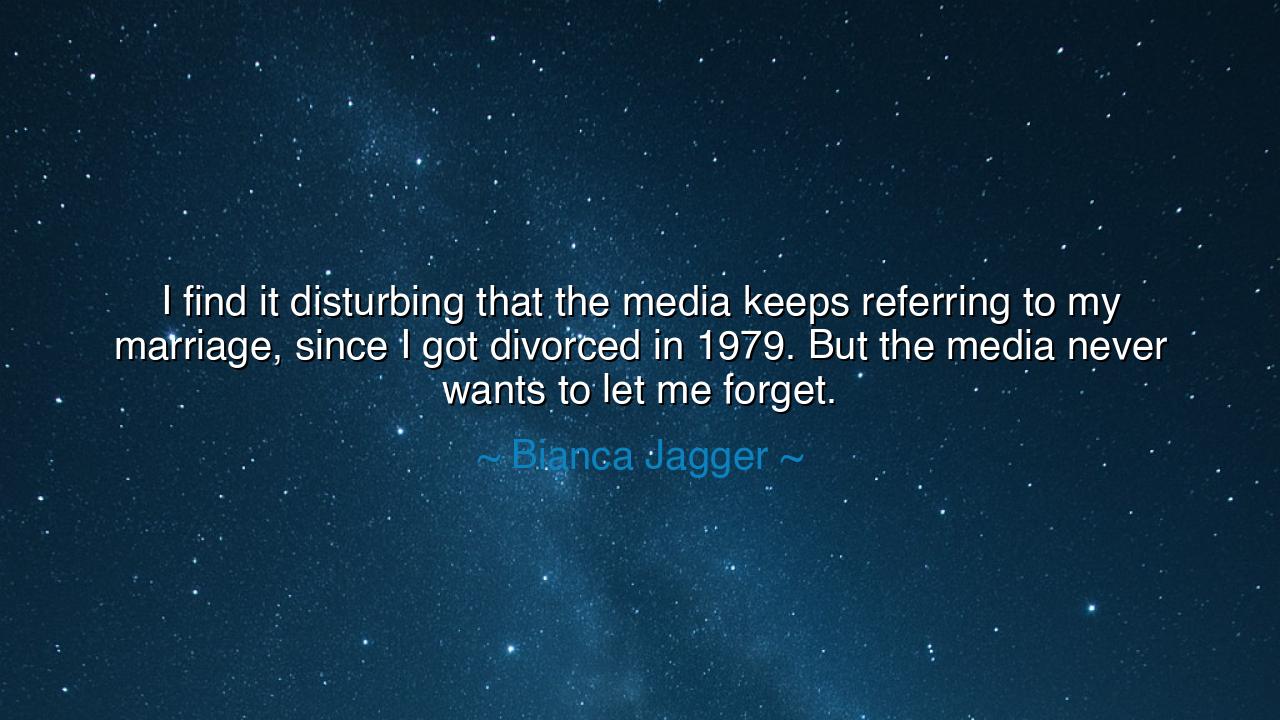
I find it disturbing that the media keeps referring to my
I find it disturbing that the media keeps referring to my marriage, since I got divorced in 1979. But the media never wants to let me forget.






Listen closely, O children, to the words of Bianca Jagger, a woman whose life has been shaped by the relentless gaze of the world. She said, "I find it disturbing that the media keeps referring to my marriage, since I got divorced in 1979. But the media never wants to let me forget." These words, though spoken with the calm wisdom of experience, reveal a deep truth about how the world often holds on to the past—especially when it involves the personal lives of those in the public eye. Jagger speaks not just of her own experience, but of a broader societal tendency to trap individuals in moments of their history, preventing them from moving forward.
What is it, O children, that makes the media so fixated on the past? Why does it cling to the stories of marriage and divorce, even when those chapters have long been closed? The answer lies in the power of narrative—the stories that we tell about each other. The media, as a reflection of society, often focuses on the dramatic, the emotional, the personal elements of people’s lives, especially those in the spotlight. These stories serve as easy hooks, captivating the public’s attention, but they also trap the individuals involved in a never-ending cycle of their former selves. The past, in this sense, becomes a prison that denies the person the opportunity to evolve, to grow, to redefine themselves.
Consider, O children, the story of Julius Caesar, the great Roman general and leader, whose personal life was constantly scrutinized, even as he fought to lead an empire. Though he was a man of remarkable accomplishments, Caesar's relationships and marriages were often overshadowed by the political forces of his time, and his private affairs became part of the public story. His marriages, his liaisons, and even his divorces were the subject of constant debate, reducing his legacy to the status of a soap opera instead of allowing him to be remembered for his triumphs and the reforms he brought to Rome. Jagger’s words echo this reality—that the media often reduces individuals to their personal histories, denying them the chance to move beyond past narratives.
In the ancient world, there were those who faced similar struggles with their public personas—their lives defined not by their deeds but by the stories that others told about them. Cleopatra, the Queen of Egypt, was often portrayed not for her intellect, leadership, or diplomatic prowess, but for her relationships with the powerful Roman figures of Julius Caesar and Mark Antony. Though she was a ruler in her own right, her legacy, as shaped by the Roman historians, became tangled with these relationships, often overshadowing the true nature of her reign. Like Jagger, Cleopatra was trapped by the narratives of her personal life, with the world unable or unwilling to see her for the leader she was.
Bianca Jagger's statement also reflects the struggles of modern women in the public eye, whose worth is often reduced to their marriages, divorces, or relationships. Women, throughout history, have been defined not by their own accomplishments or abilities, but by their connections to powerful men—whether through marriage or association. The media, and by extension society, too often holds them to these past events, even when they have long moved on. Jagger was married to Mick Jagger, the lead singer of the Rolling Stones, but her life and work as an activist, advocate for human rights, and public figure should stand apart from her marriage. Yet, the world continues to define her by the relationship of her past.
The lesson, O children, is clear: we are not our pasts. A person’s value is not determined by their marriage, divorce, or the stories that others tell about them. It is essential to recognize that people change, they grow, and they should not be confined to a version of themselves that others have chosen to keep alive. Jagger’s words remind us that we must allow people to define their own narratives, to move forward, and to be seen for who they are now—not who they once were. It is a call to free ourselves from the stories that others have written for us and to claim the power to rewrite our own.
In your own life, O children, be mindful of the stories you tell about others. Do not hold them captive to their past mistakes, their old relationships, or the circumstances that have come and gone. Allow them the freedom to evolve, to grow, and to become who they truly are. When you look at others, see them not for their history alone, but for their present, and for the potential they have to shape the future. This is the gift of wisdom—to allow people the space to transform, and to never judge them by a past that no longer defines them. Let their actions, their character, and their current choices be the only measure of who they are.






AAdministratorAdministrator
Welcome, honored guests. Please leave a comment, we will respond soon